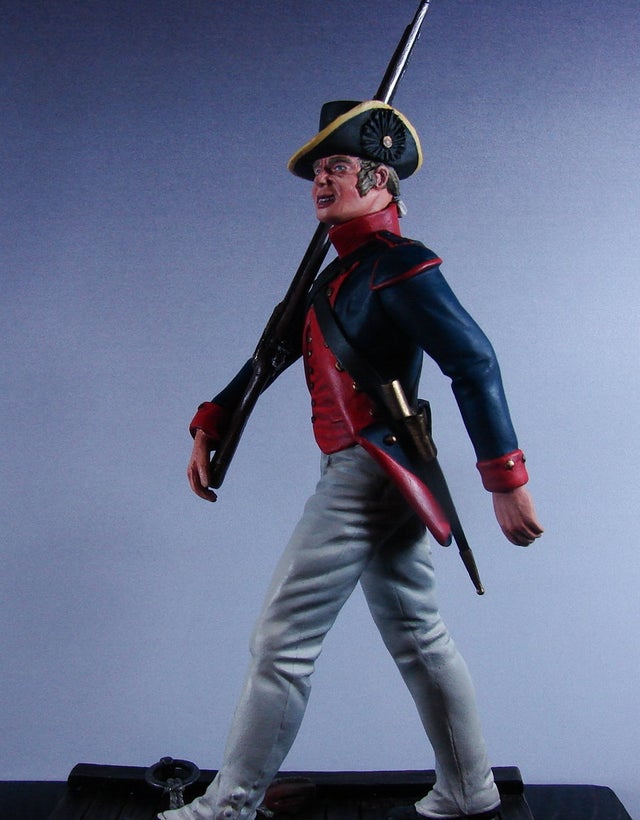- Store
- >
- TLB Kits (Worster Miniatures)
- >
- 120-7 120mm Tripoli Marine
120-7 120mm Tripoli Marine
SKU:
$39.95
$39.95
Unavailable
per item
In October 1803, Tripoli's fleet captured USS Philadelphia intact after the frigate ran aground on a reef while patrolling Tripoli harbor. Efforts by the Americans to float the ship while under fire from shore batteries and Tripolitan Naval units failed. The ship, its captain, William Bainbridge, and all officers and crew were taken ashore and held as hostages. Philadelphia was turned against the Americans and anchored in the harbor as a gun battery.
On the night of 16 February 1804, Lieutenant Stephen Decatur led a small detachment of U.S. Marines aboard the captured Tripolitan ketch rechristened USS Intrepid, thus deceiving the guards on Philadelphia to float close enough to board her. Decatur's men stormed the ship and overpowered the Tripolitan sailors. With fire support from the American warships, the Marines set fire to Philadelphia, denying her use by the enemy. British admiral, Horatio Nelson, himself known as a man of action and courage, reportedly called this "the most bold and daring act of the age."
Preble attacked Tripoli on 14 July 1804, in a series of inconclusive battles, including a courageous but unsuccessful attack attempting to use Intrepid under Captain Richard Somers as a fire ship, packed with explosives and sent to enter Tripoli harbor, where she would destroy herself and the enemy fleet. However, Intrepid was destroyed, possibly by enemy gunfire, before she achieved her goal, killing Somers and his entire crew.
The turning point in the war was the Battle of Derna (April–May 1805). Ex-consul William Eaton, a former Army captain who used the title of "general", and US Marine Corps 1st Lieutenant Presley O'Bannon led a force of eight U.S. Marines and five hundred mercenaries—Greeks from Crete, Arabs, and Berbers on a march across the desert from Alexandria, Egypt, to capture the Tripolitan city of Derna. This was the first time the United States flag was raised in victory on foreign soil. The action is memorialized in a line of the Marines' Hymn—"the shores of Tripoli". The capturing of the city gave American negotiators leverage in securing the return of hostages and the end of the war.
On the night of 16 February 1804, Lieutenant Stephen Decatur led a small detachment of U.S. Marines aboard the captured Tripolitan ketch rechristened USS Intrepid, thus deceiving the guards on Philadelphia to float close enough to board her. Decatur's men stormed the ship and overpowered the Tripolitan sailors. With fire support from the American warships, the Marines set fire to Philadelphia, denying her use by the enemy. British admiral, Horatio Nelson, himself known as a man of action and courage, reportedly called this "the most bold and daring act of the age."
Preble attacked Tripoli on 14 July 1804, in a series of inconclusive battles, including a courageous but unsuccessful attack attempting to use Intrepid under Captain Richard Somers as a fire ship, packed with explosives and sent to enter Tripoli harbor, where she would destroy herself and the enemy fleet. However, Intrepid was destroyed, possibly by enemy gunfire, before she achieved her goal, killing Somers and his entire crew.
The turning point in the war was the Battle of Derna (April–May 1805). Ex-consul William Eaton, a former Army captain who used the title of "general", and US Marine Corps 1st Lieutenant Presley O'Bannon led a force of eight U.S. Marines and five hundred mercenaries—Greeks from Crete, Arabs, and Berbers on a march across the desert from Alexandria, Egypt, to capture the Tripolitan city of Derna. This was the first time the United States flag was raised in victory on foreign soil. The action is memorialized in a line of the Marines' Hymn—"the shores of Tripoli". The capturing of the city gave American negotiators leverage in securing the return of hostages and the end of the war.
